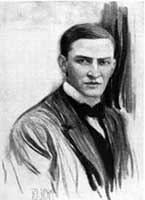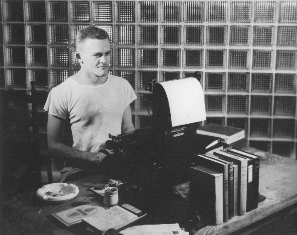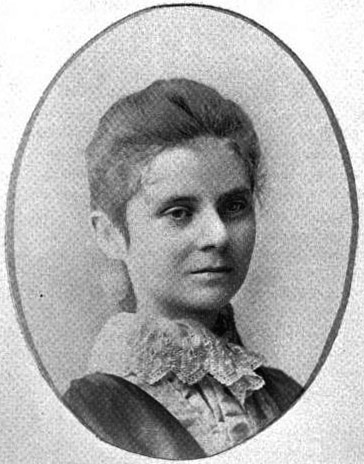
Peter Fritzsche
Born: 1959 in Chicago, Illinois
Pen Name: None Connection to Illinois: Fritzsche was born in Chicago and has been with the Department of History at the University of Illinois at Urbana-Champaign, since 1987. Biography: Peter Fritzsche is the W. D. & Sarah E. Trowbridge professor of history at the University of Illinois and the author of ten previous books, including An Iron Wind: Europe Under Hitler and the award-winning Life and Death in the Third Reich. He lives in Urbana, Illinois.
Awards:
Selected Titles
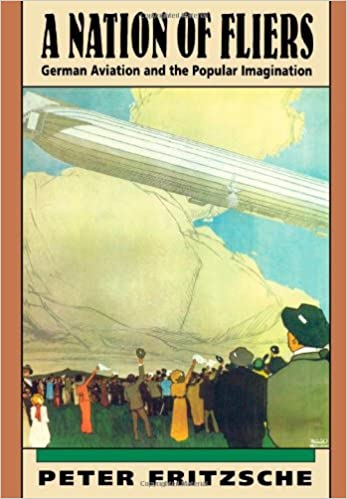 |
A Nation of Fliers: German Aviation and the Popular Imagination ISBN: 9780674037380 OCLC: 73998988 Annotation Shows how the fascination of the German people with flight combined idealized notions of vitality and modernity with symbols of conquest over the natural and political worlds. Annotation copyrighted by Book News, Inc., Portland, OR. |
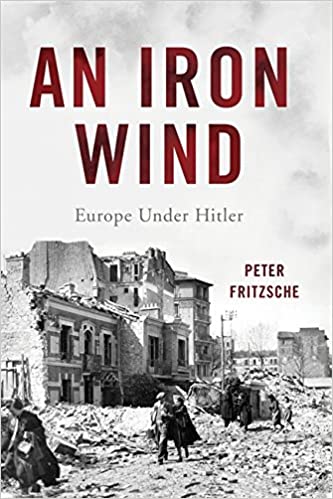 |
An Iron Wind: Europe Under Hitler ISBN: 0465057748 OCLC: 945232327 "Unlike World War I, when the horrors of battle were largely confined to the front, World War II reached into the lives of ordinary people in an unprecedented way. Entire countries were occupied, millions were mobilized for the war effort, and in the end, the vast majority of the war's dead were non-combatant men, women, and children. Inhabitants of German-occupied Europe--the war's deadliest killing ground--experienced forced labor, deportation, mass executions, and genocide. As direct targets of and witnesses to violence, rather than far-off bystanders, civilians were forced to face the war head on. Drawing on a wealth of diaries, letters, fiction, and other first-person accounts, award-winning historian Peter Fritzsche redefines our understanding of the civilian experience of war across the vast territory occupied and threatened by Nazi Germany. Amid accumulating horrors, ordinary people across Europe grappled with questions of faith and meaning, often reaching troubling conclusions. World War II exceeded the human capacity for understanding, and those men and women who lived through it suspected that language could not adequately register the horrors they saw and experienced. But it nevertheless prompted an outpouring of writing, as people labored to comprehend and piece thoughts into philosophy. Their broken words are all we have to reconstruct how contemporaries saw the war around them, how they failed to see its terrible violence in full, and how they attempted to translate the destruction into narratives. Carefully reading these testimonies as no historian has done before, Fritzsche's groundbreaking work sheds new light on the most violent conflict in human history, when war made words inadequate, and the inadequacy of words heightened the devastation of war."--Publisher information. |
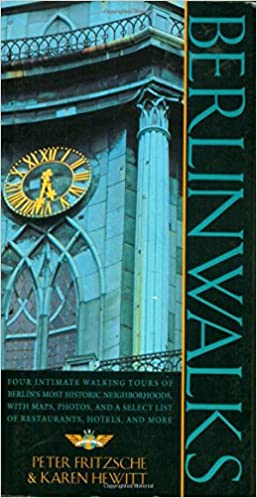 |
Berlinwalks/Four Intimate Walking Tours of Berlin's Most Historic Neighborhoods, With Maps, Photos, and a Select List of Restaurants, Hotels, and More ISBN: 0752216015 OCLC: 32203949 Boxtree, London : 1994. |
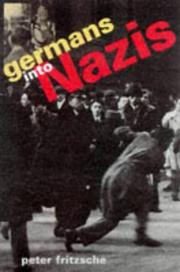 |
Germans into Nazis ISBN: 067435091X OCLC: 37157352 Harvard University Press, Cambridge, Mass. : 1998. Why did ordinary Germans vote for Hitler? In this dramatically plotted book, organized around crucial turning points in 1914, 1918, and 1933, Peter Fritzsche explains why the Nazis were so popular and what was behind the political choice made by the German people. Rejecting the view that Germans voted for the Nazis simply because they hated the Jews, or had been humiliated in World War I, or had been ruined by the Great Depression, Fritzsche makes the controversial argument that Nazism was part of a larger process of democratization and political invigoration that began with the outbreak of the war. |
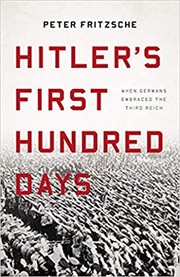 |
Hitler's first hundred days : ISBN: 154169743X OCLC: 1108523651 "Over just a few months in spring 1933, Germany transformed from a deeply divided republic into a one-party Nazi dictatorship. In Hitler's First Hundred Days, award-winning historian Peter Fritzsche offers a probing new account of the dramatic and pivotal period when Germans became Nazis and the Third Reich began. Amid the ravages of economic depression, Germans in the early 1930s were pulled to political extremes both left and right. But after Adolf Hitler's appointment as chancellor in January, the Nazis moved with brutality and audaciousness to swiftly create a new political order. Fritzsche closely examines the events of these days--the elections and mass arrests, the gunfire and bonfires, the patriotic rallies and anti-Jewish boycotts--to understand both the terrifying power that the National Socialists exerted over ordinary Germans, and the powerful appeal of the new era they promised. Going down streets, up stairwells, and into German homes, rifling through newspapers, letters, and diaries, listening to the sounds of the radio and to song and slogan, Fritzsche unfolds the moments when suddenly dissenting voices went silent and almost everyone seemed to be a Nazi. It was a time characterized by both coercion and consent--but ultimately, a majority of Germans preferred the Nazi future to the Weimar past. Remarkably rich and illuminating, Hitler's First Hundred Days is the chilling story of the beginning of the end, when one hundred days seemed to inaugurate a new thousand-year Reich"-- |
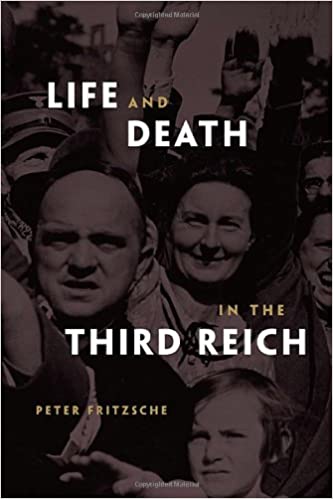 |
Life and death in the Third Reich / ISBN: 0674034651 OCLC: 444776420 Belknap : Cambridge, Mass. ; 2009, ©2008. " ... Peter Fritzsche deciphers the puzzle of Nazism's ideological grip. Its basic appeal lay in the Volksgemeinschaft -- a "people's community" that appealed to Germans to be part of a great project to redress the wrongs of the Versailles treaty, make the country strong and vital, and rid the body politic of unhealthy elements. The goal was to create a new national and racial self-consciousness among Germans. For Germany to live, others -- especially Jews -- had to die. Diaries and letters reveal Germans' fears, desires, and reservations, while showing how Nazi concepts saturated everyday life. Fritzsche examines the efforts of Germans to adjust to new racial identities, to believe in the necessity of war, to accept the dynamic of unconditional destruction -- in short, to become Nazis"--Pub. website. |
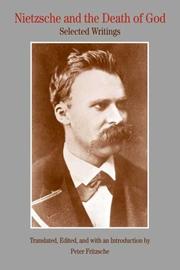 |
Nietzsche and the death of God : ISBN: 0312450222 OCLC: 85852181 Bedford/St. Martin, Boston, MA : 2007. |
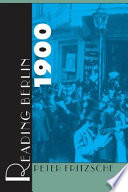 |
Reading Berlin 1900 ISBN: 9780674037366 OCLC: 434586567 Harvard University Press, Cambridge, Mass. : 1998. |
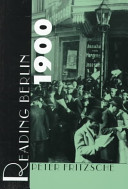 |
Reading Berlin 1900 / ISBN: 0674748824 OCLC: 33079816 Harvard University Press, Cambridge, Mass. : 1996. Berlin in 1900 attracted writers, artists, and filmmakers whose fascination with the city manufactured an elaborate urban culture that insinuated itself into the most casual metropolitan encounters. The newspapers' daily versions fabricated Berlin into a sensational place, transforming city dwellers into flaneurs, browsers, and spectators. Paying more attention to the kaleidoscope of urban life than to singular world events, the print media reconstituted the metropolis into an extraordinary field of visual pleasure. At the same time, thanks to the extravagant and dramatic operations of the media, Berlin began to look more like the sensational front pages. Almost all Berliners were readers, and each day they took inventory of boulevards and alleyways, princes and prostitutes, the latest fashions and vanished landmarks. They consumed the city's sights as well as its commodities. Their city was an unending serial of surprise. Berlin's print culture enchanted the metropolis and thereby anticipated a modernist sensibility that celebrated the urban experience of discontinuity, instability, and transience. Fritzsche carefully explores this coming modernity, disentangling its myths from the modern experience itself and yielding an urban enclave at odds with its intended imperial destiny. It's a sharp-edged story with cameo appearances by Georg Simmel, Walter Benjamin, and Alfred Doblin. This sumptuous history of a metropolis and its social and literary texts, of furtive glances and passersby, provides a rich evocation of a particularly exuberant, particularly fleeting moment in history. |
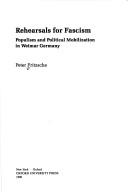 |
Rehearsals for fascism : ISBN: 0195057805 OCLC: 19739444 Oxford University Press, New York : 1990. |
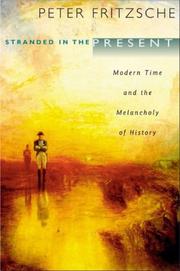 |
Stranded in the present : ISBN: 0674013395 OCLC: 53831746 Harvard University Press, Cambridge, Mass. : 2004. "In this book, Peter Fritzsche explores how Europeans and Americans saw themselves in the drama of history, how they took possession of a past thought to be slipping away, and how they generated countless stories about the sorrowful, eventful paths they chose to follow." "Tracing the scars of history, writers and painters, revolutionaries and exiles, soldiers and widows, and ordinary home dwellers took a passionate, even flamboyant, interest in the past. They argued politics, wrote diaries, devoured memoirs, and collected antiques, all the time charting their private paths against the tremors of public life. These nostalgic histories take place on battlefields trampled by Napoleon, along bucolic English hedges, against the fairytale silhouettes of the Grimms' beloved Germany, and in the newly constructed parlors of America's western territories." "This book takes a look at the modern age: our possessions, our heritage, and our newly considered selves."--Jacket. |
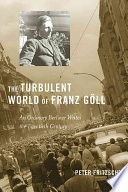 |
The turbulent world of Franz Göll : ISBN: 0674055314 OCLC: 754819993 Harvard University Press, Cambridge, Mass. : 2011. Franz Göll was a thoroughly typical Berliner. He worked as a clerk, sometimes as a postal employee, night watchman, or publisher's assistant. He enjoyed the movies, ate spice cake, wore a fedora, tamed sparrows, and drank beer or schnapps. He lived his entire life in a two-room apartment in Rote Insel, Berlin's famous working-class district. What makes Franz Göll different is that he left behind one of the most comprehensive diaries available from the maelstrom of twentieth-century German life. Deftly weaving in Göll's voice from his diary entries, Fritzsche narrates the quest of an ordinary citizen to make sense of a violent and bewildering century. Peter Fritzsche paints a deeply affecting portrait of a self-educated man seized by an untamable impulse to record, who stayed put for nearly seventy years as history thundered around him. Determined to compose a "symphony" from the music of everyday life, Göll wrote of hungry winters during World War I, the bombing of Berlin, the rape of his neighbors by Russian soldiers in World War II, and the flexing of U.S. superpower during the Reagan years. In his early entries, Göll grappled with the intellectual shockwaves cast by Darwin, Freud, and Einstein, and later he struggled to engage with the strange lifestyles that marked Germany's transition to a fluid, dynamic, unmistakably modern society. With expert analysis, Fritzsche shows how one man's thoughts and desires can give poignant shape to the collective experience of twentieth-century life, registering its manifold shocks and rendering them legible. |


